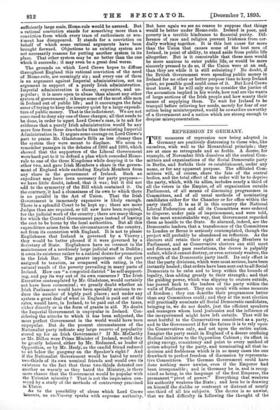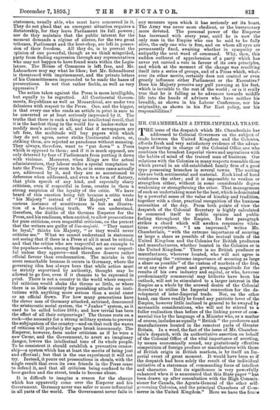REPRESSION IN GERMANY. T HE measures of repression now being adopted
in Germany are positively distressing to those who, like ourselves, wish well to the Monarchical principle ; they are at once so retrograde and so feeble. A decree, for example, of November 30th dissolves all the central Com- mittees and organisations of the Social Democratic party in Berlin, and forbids their re-establishment, under any name, or for any apparent purpose. The affiliated Com- mittees will, of course, share the fate of the central bodies, and the total effect of the order will be to deprive the party,. which, with its allies, includes nearly a third of all the voters in the Empire, of all organisation outside Parliament, of all means of discussing programmes in Committees, and of all usual methods of nominating candidates either for the Chamber or for office within the party itself. It is as if in this country the National Liberal Federation and all its Committees were ordered to disperse, under pain of imprisonment, and were told, in the most unmistakable way, that Government regarded them as hostile to the State. So alarmed, indeed, are the Democratic leaders, that a transference of the Committees to London or Berne is seriously contemplated, though the project will probably be abandoned on reflection. As the electors still retain their right of sending Members to Parliament, and as Conservative electors can still meet and discuss and pass resolutions, the decree is palpably unfair, while it cannot destroy, or even seriously weaken, the strength of the Democratic party itself. Its only effect is that the party divisions, which were most serious, have been instantly healed; that orders have been sent out to all Social Democrats to be calm and to keep within the bounds of legality, thus adding greatly to their strength ; and that the guiding power, which was slipping to orators outside, has passed back to the leaders of the party within the walls of Parliament. They can speak with some measure of freedom ; they can describe their programmes better than any Committees could ; and they at the next election will practically nominate all Social Democratic candidates, bringing in, we do not doubt, just the efficient speakers and managers whom local jealousies and the influence of the inexperienced might have left outside. That will be most hurtful to the Conservatives considered as a party, and to the Government if for the future it is to rely upon the Conservatives only, and not upon the entire nation. Imagine the party result in England of a decree confining Radical initiative to the Opposition Cabinet ; its effect in giving energy, consistency and point to every method of action adopted by the party, and terminating all that in- decision and feebleness which is in so many cases the one drawback to perfect freedom of discussion by representa- tive Committees. The German Government could have done nothing more unwise, even if the Emperor had been irresponsible ; and in Germany he is, and is recog- nised as being, in the language of the first Emperor, the permanent "pivot of power." Everything that weakens his authority weakens the State ; and here he is drawing on himself the dislike or contempt or distrust of nearly one-third of all his subjects. The decree is so unwise, that we find difficulty in following the thought of the statesmen, usually able, who must have concurred in it. They do not plead that an emergent situation requires a dictatorship, for they leave Parliament its full powers ; nor do they maintain that the public interest for the moment demands a regime of silence, for the two great tribunes, Parliament and. the beer-shop, are left in posses- sion of their freedom. All they do, is to prevent the opinion of one powerful, though as we think misguided, party from finding expression through any representatives who may not happen to have found seats within the Legis- lature. The House of Commons is left free, and Mr. Labouchere may say what he likes ; but Mr. Schnadhorst is threatened with imprisonment, and the private letters of his Committeemen impounded to be made the bases of prosecutions. Is not that rather feeble, as well as very oppressive ?
The action taken against the Press is more intelligible, but equally to be regretted. All Continental Govern- ments, Republican as well as Monarchical, are under two delusions with respect to the Press. One, and the bigger, is that every one who reads an article in print is sure to be converted or at least seriously impressed by it. The truths that there is such a thing as intellectual recoil, that it is the hardest thing in the world for a leader-writer to modify men's action at all, and that if newspapers are left free, the multitude will buy papers with which they do not agree, never strike Continental rulers, or, atriking them, are rejected as paradoxes without meaning. They always, therefore, want to "put down" a Press which is opposed to them ; and if it is much opposed, are only deterred by fear of Parliaments from putting it down with violence. Moreover, when Kings are the actual administrators, they labour under a special temptation to hate the Press. They seem to be, or in some cases actually are, addressed by it, and they are so accustomed to deference when addressed, and even to a form of flattery, that plain speech of any kind, and especially sharp criticism, even if respectful in form, creates in them a strong suspicion of the loyalty of the critic. We have heard of this emotion being felt because a critic wrote "his Majesty" instead of "His Majesty," and that curious instance of sensitiveness is but an illustra- tion of a far-reaching truth. We can understand, therefore, the dislike of the German Emperor for the Press, and his readiness, when excited, to allow prosecutions for pure criticism, even respectful criticism, on the pretext that the writers are guilty of lese-majeste. "They cannot be loyal," thinks his Majesty, "or they would never criticise me." What we cannot understand is statesmen not seeing that if there is a Press at all it must be critical, and that the critics who are respectful set an example to the populace—who, among themselves, are never respect- ful unless they approve—and therefore deserve rather official favour than condemnation. The mistake is the more remarkable because it occurs in Germany, where the governing idea has always been that while action must be strictly supervised by authority, thought may be allowed to go free, even if it chances to be expressed in print. There is not a country in the world where respect- ful criticism would shake the throne so little, or where there is so little necessity for punishing attacks on insti- tutions with anything more serious than a social sneer or an official frown. For how many generations have the clever men of Germany attacked, satirised, denounced the aristocratic social system, the " Junker" system, as it used to be called. before 1864; and how trivial has been the effect of all their outpourings ! The throne rests on a rock—the necessity for a strong military system to prevent - the subjugation of the country—and on that rock the waves of criticism will probably for ages break innocuously. The Emperor, however, frets under criticism as if he were a new CEesar, and the Government, to avert an imaginary danger, lowers the intellectual tone of its whole people. To be consistent it should establish a preventive censor- ship—a system which has at least the merits of being just and effectual ; but that is the one experiment it will not try. Instead, it pours out prosecutions in shoals, with the single result that even its own friends in the Press cease to defend it, and that all criticism being confined to the beer-garden and the street, tends to become abuse.
It is difficult to imagine a reason for the change which has apparently come over the Emperor and his Government. Germany never was safer or more influential in all parts of the world. The Government never fails in any measure upon which it has seriously set its heart. The Army was never more obedient, or the bureaucracy more devoted. The personal power of the Emperor has increased with every year, until he is now the only man in the Empire who can be said to be fully alive, the only one who is free, and on whom all eyes are permanently fixed, awaiting whether in sympathy or antipathy the next word of command. Why, then, this sudden outburst of apprehension of a party which has never yet carried a vote in favour of its own principles, and which at the moment of the change was resolving itself into a series of groups, and of a Press which, what- ever its other merits, certainly does not control or even greatly influence either Parliament or the Executive? Does his Majesty perceive any gulf yawning at his feet, which is invisible to the rest of the world ; or is it really true that he is falling as he advances towards middle life into the hands of advisers who have neither his breadth, as shown in his Labour Conference, nor his originality, as shown in his Far East policy, nor his responsibilities ?























































 Previous page
Previous page